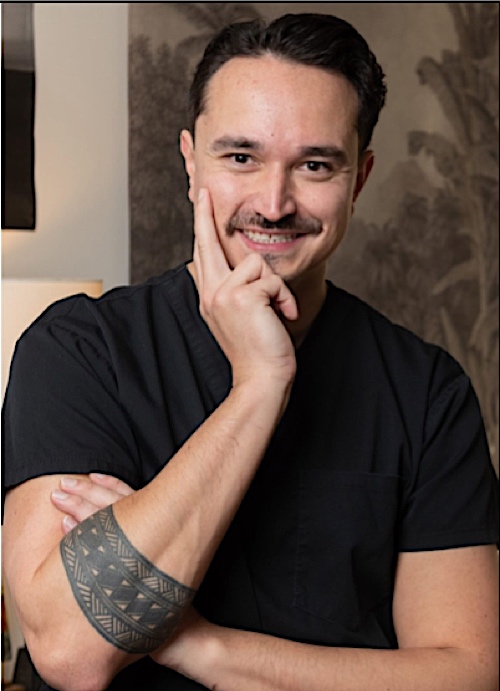Dr. Matt Bray
Dr. Bray is one of five Australian Medical Association Victoria Members recognised for their commitment, vision and leadership

FINALIST: AMA VICTORIA JUNIOR DOCTOR OF THE YEAR 2025: DR. MATT BRAY
"Emergency medicine medicine is, for me, the epitome of equity and inclusion."
Dr Matt Bray (MBBS, MPH & TM) is a Senior Emergency Medicine Registrar at the Royal Melbourne Hospital and a proud Australian of Rotuman heritage. Committed to health equity and international collaboration, Matt's work spans clinical care in the Pacific, not-for-profit governance, college roles, and advocacy for communities impacted by colonisation and climate change. His contributions have earned him a Global Voices UN Research Fellowship, participation in the US State Department International Visitors Leadership Program, and board roles in health and cultural organisations. In 2025, Matt was a finalist for the AMA Victoria Junior Doctor of the Year Award, recognising his leadership and dedication to social justice in medicine.
Coming from a bicultural background with a family that is spread across the Pacific, I initially imagined myself pursuing a career in diplomacy. But at the end of high school, my parents encouraged me to pursue medicine. They recognised its timeless noble quality and a real immediacy in your ability to impact people's lives. That appealed to me as an idealistic teenager raised in a community that emphasised social justice and service. Building on that social capital, I've been able to marry my interests and have a broader impact by being active in the realm of public health and in the Pacific. My vision is of a career that spans the Pacific region in an evolving clinical role whilst, on a larger scale, addressing some of the systemic drivers to inequitable access to healthcare for First Nations and Pasifika peoples.
In 2017, I took a break from training and worked voluntarily on the island of Rotuma in Fiji, where my family is from. I was there as a medical officer, practising community medicine on a tiny, remote island alongside my cousin. Being able to care for people in the place my identity is rooted was incredibly fulfilling. My days were a blend of medical work and cultural connection: walking to the clinic each morning, caring for elders, speaking in language, playing volleyball with hospital staff in the afternoons, and swimming on beaches where my ancestors have fished for millennia. There were challenges, too. Working in a small community with limited resources, where you are both personally invested and professionally responsible for critical decisions, was demanding. Learning to navigate that was a significant part of maturing as a doctor.
My background, and my time in Rotuma, deepened my awareness of how culture, history, and identity shape people's experiences of health and healthcare. In Australian EDs, I've witnessed how patients from culturally and linguistically diverse backgrounds, especially First Nations communities, can feel unseen or misunderstood. For me, the concept of 'cultural literacy' speaks to our responsibility as clinicians and systems to make the effort to connect with patients in the fullness of their personhood and respond with humility. It's not simply about avoiding harm, but about creating spaces where people feel safe, heard, and valued. Whether through governance roles, advocacy work, or simply listening more intently in clinical encounters, I've tried to contribute to building a system that's more equitable and more responsive to diverse communities.
My path through medicine hasn't followed the typical timeline, and that's okay.
I'm a senior registrar now, but it's taken longer than the expected route. I've stepped away from training at different points: to work overseas, complete a Master of Public Health, or simply pause for my own wellbeing. Earlier in my career, I worried that taking these detours meant I didn't belong, or that I was falling behind. But I've learned that medicine shouldn't be a rigid track and feel these experiences outside the traditional path have made me a better doctor and a more grounded person. As someone with a bicultural identity, I've felt a responsibility to be visible and authentic in this profession, and to show there's space for people from diverse backgrounds, and for those who choose paths that look different. Representation matters, both for our colleagues and the communities we serve.
I would never have predicted as a medical student that I'd end up in emergency medicine, but after a few rotations, I realised I'd found my tribe.
The strong sense of collective endeavour and the close collaboration between doctors and nurses felt reminiscent of village life. Above all, emergency medicine is, for me, the epitome of equity and inclusion. It's literally the open front door of the hospital, where all are welcome, regardless of their story, status, or circumstances. We meet people and their families on what may be the worst day of their lives, in moments of vulnerability and uncertainty. There's a profound privilege and responsibility in being able to offer calm, reassurance, and knowledgeable care, and to quickly build trust and rapport. It's demanding, but I can't imagine a specialty that better aligns with my values of service, justice, and connection.
From August 2025, I'll be working in Honiara in the Solomon Islands, participating in the Volunteer Emergency Medicine Registrar Program for six months.
The program, facilitated by the Department of Foreign Affairs, the Australian Volunteers Progrm, and the Australasian College for Emergency Medicine, places Australian emergency medicine registrars in EDs in Papua New Guinea, East Timor, Vanuatu, and the Solomon Islands. I'll be working in a capacity-strengthening role alongside local doctors, contributing to training, quality improvement and providing an extra set of hands. It feels like a natural continuation of my journey: a chance to learn, build relationships, and help strengthen systems in a region that's part of my identity. It's another step in weaving together my clinical skills, my heritage, and my commitment to making healthcare fairer for everyone, no matter where they come from.





